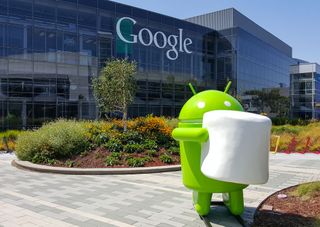Report: Google to Seize Control of Android Updates
One tech analyst says Google may send Android OS updates directly to phones and tablets, bypassing device makers and cellular carriers.
Android users frustrated with the slow speed of OS updates reaching their devices may finally get some relief, according to Richard Windsor, an London-based technology analyst. Windsor thinks Google may soon take over the distributions of Android updates and security patches because handset makers and cellular carriers aren't doing a good job of it.

Speaking to the British tech site The Register, Windsor, of Edison Investment Research, pointed out the alarming discrepancy between Android and iOS adoption rates. Android Marshmallow was released one month after iOS 9 last fall, yet Apple's current mobile platform is installed on 87 percent of iOS devices, while Marshmallow is on a mere 1.2 percent of Android devices.
However, Windsor didn't cite any Google sources or inside information to back up his assertion. It's not clear if he's privy to hidden secrets, or believes that it's inevitable Google will take over the Android update process, or if he simply thinks it merely should.
MORE: The Best Android Apps to Try Today
Avi Greengart, research director for consumer electronics at market-research firm Current Analysis, agreed that Google is not happy about the Android update process, but added that there may be risks of losing market share if Google seizes the reins entirely.
"Google is certainly frustrated that carriers — and device vendors — are slow to provide updates," Greengart told Tom's Guide. "Google is probably willing to ignore any pushback from carriers and device vendors on the update cycle — Apple manages the process entirely internally — but not if doing so means losing the community of developers who build things on top of Android, including the entire Chinese smartphone and tablet market."
But full Google control of OS updates might mean a massive improvement for Android security, according to Jon Oberheide, co-founder of Duo Security in Ann Arbor, Michigan.
Sign up to get the BEST of Tom's Guide direct to your inbox.
Get instant access to breaking news, the hottest reviews, great deals and helpful tips.
"The reason why Android security is so poor isn't that it has more vulnerabilities; it's that the patches for those vulnerabilities are never pushed out to users' devices," Oberheide told us. "Contrast this with iOS, where Apple controls the hardware and software, and can deliver updates in a centralized fashion to quickly patch security vulnerabilities."
If you're wondering how Google could adopt Apple's software-distribution model, Windsor told The Register that the company "will end up taking complete control of Android by moving the entire OS into its services layer known as Google Mobile Services."
Google Mobile Services (GMS) is the bundle of apps and processes that device makers must accept to have their Android builds "Google certified." GMS apps include Gmail, Google Calendar, Google Maps, the Chrome browser and, last but definitely not least, the entire Google Play Services ecosystem that lets users download screened apps directly from Google instead of taking their chances with unknown vendors.
"Google is already putting more of the core user experience into Google Play Services, which it can push directly to consumers," Greengart said. "Google is also working with carriers and device vendors to push out OS-level security patches on a monthly basis."
For example, in 2013, the anti-theft feature Android Device Manager was pushed out to all devices via Google Play, without carrier or device-maker input. Updates to Device Manager have arrived the same way.
Marshmallow makes Android safer by simplifying security controls and letting users choose the permissions granted to individual apps. It also has useful features such as Google Now On Tap and the battery-optimizing Doze function.
But thanks to device makers and carriers dragging their heels, North American users see these features primarily on Nexus and Samsung Galaxy devices — and Samsung began pushing out its Marshmallow updates only this week.
The slow rollout of Android updates is often blamed on compatibility issues. Device makers and carriers are free to customize Android, although their options are constrained if they accept Google certification and the GMS bundle. (Many Chinese device makers don't.) Manufacturers often fit Android to their hardware, rather than the other way around.
The thousands of different Android devices, and the huge variety of manufacturer modifications, such as Samsung's TouchWiz user interface, would make updates harder for Google than they are for Apple, the latter of which has to support only a half-dozen devices.
Windsor told The Register that he foresees a simple solution — the Google coup d'etat would strip Android of device-manufacturer modifications.
"The net result is that a Google device will become much like an iOS or a Windows 10 device," he said, "with absolutely no options for handset makers to make any changes."
As ambitious and difficult as this may be, Microsoft has been able to push out massive operating-system updates to thousands of different Windows PCs for decades, and now does so with Windows Phones as well.

Henry is a managing editor at Tom’s Guide covering streaming media, laptops and all things Apple, reviewing devices and services for the past seven years. Prior to joining Tom's Guide, he reviewed software and hardware for TechRadar Pro, and interviewed artists for Patek Philippe International Magazine. He's also covered the wild world of professional wrestling for Cageside Seats, interviewing athletes and other industry veterans.